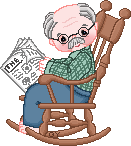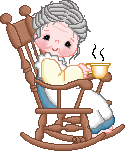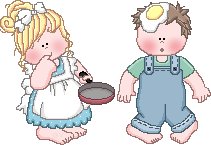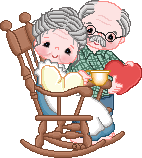Let's look at the History
of "Grandparents Day":
"The
impetus for a National Grandparents Day originated with
Marian McQuade, a housewife in Fayette County, West
Virginia. Her primary motivation was to champion the
cause of lonely elderly in nursing homes. She also hoped
to persuade grandchildren to tap the wisdom and heritage
their grandparents could provide. President Jimmy Carter,
in 1978, proclaimed that National Grandparents Day would
be celebrated every year
on the first Sunday after Labor Day."
~Source National Grandparents Day Official Site~
To learn more about the History of the Holiday
visit their "How
Grandparents Day Began" page.

There is no doubt at all! Grandparents are indeed a
blessing from the Lord! They bring special memories to
our minds and hearts. What a wonderful gift Grandparents
are. Not just to the Grandkids but to the parents too!
What does the Bible say
about Grandparents?

I
had a hard time trying to find information in the Bible
about 'Grandparents'. Actually I did a search and there
were no verses with the word "Grandparent" in
it.
Baker's Evangelical
Dictionary of Biblical Theology has a great page
that explains about the Family Life and
Relations in the Bible times. It
is hard for us to understand what an extended family is
really all about. Nave's Topical
Bible has many verses about
the "family". Torrey's Topical
Textbook has a page about "families" too.
Well
after digging further I found in few references to
"grandparents" in my Nelson's Topical Bible
Index:
Grandmother.........Lois thus
called.......in 2 Timothy 1:5
"When
I call to remembrance the unfeigned faith that is in
thee, which dwelt first in thy grandmother Lois, and thy
mother Eunice; and I am persuaded that in thee
also."
Greek
Lexicon - For above verse - Strongs' No. <3125>
mamme {mam'-may}
mavmmh
Word Origin - of natural origin ["mammy"]
noun feminine
Word Usage in KJV
Grandmother is mentioned 1 time
Definition(s)
1) mother (the name infants use in addressing their
mother)
2) grandmother

Grandchildren.........
- Lot
becomes father of through incest.........Gen
19:30-38
- Abdon's.........Judges
12:13&14
- Widow's...........1
Timothy 5:4
- Iniquity
visited on..........Exodus 34:7
- Served
idols.........2 Kings 17:41
- Crown
of old men........Proverbs 17:6
- Practice
piety toward family.........1 Timothy 5:4
I also thought I would
check:
"children's
children" in a Bible Search and
came up with this:
"And
thou shalt dwell in the land of Goshen, and thou shalt be
near unto me, thou, and thy children, and thy children's
children, and thy flocks, and thy
herds, and all that thou hast:"
~Genesis 45:2~
"Keeping
mercy for thousands, forgiving iniquity and transgression
and sin, and that will by no means clear the guilty;
visiting the iniquity of the fathers upon the children,
and upon the children's children, unto the third
and to the fourth generation."
~Exodus 34:7~
"But
the mercy of the LORD is from everlasting to everlasting
upon them that fear him, and his righteousness unto children's
children;"
~Psalm 103:17~
"A
good man leaveth an inheritance to his children's
children: and the wealth of the
sinner is laid up for the just."
~Proverbs 13:22~
"Children's
children are the crown of old men;
and the glory of children are their fathers."
~Proverbs 17:6~

"Yea, thou shalt see thy children's
children, and peace upon
Israel."
~Psalm 128:6~
What Bible story comes to
your mind when you think of Grandparents?
The
story that comes to my mind when I think about
grandparents and the Bible is the story of Ruth.
Grandparents don't have to be grandparents by blood to
feel like family. Remember that Naomi considered Ruth's
child Obed her own. But in the beginning Naomi moved with
her husband and 2 sons to an unknown land. The people
didn't worship their God. Her 2 sons married women of a
different culture and faith but she loved them as if they
were her own daughters. It us not always the norm to have
a mother in law treat her daughter in law as a daughter
but it does happen and when it does it is a true blessing
for both the women. They were not bonded by blood but by
the love of a mother for her son and the love of a wife
for her husband. What an amazing Grandmother she must
have been!

Here are some more definitions:
What are "Great
Grandparent's"?
Some
of you might be blessed to have your Great Grandparent's
still alive. Here is the dictionary definition:
great-grand•par•ent
(grAt"gran'pÔr"unt,
-par"-, -grand'-),
—n.
a grandfather or grandmother of one's father or mother.

What are your memories of
your Grandparents?
I
remember.........driving each summer on the long trip to
my grandparent's houses. We lived a long way from them
and only saw them once a year. For me it was kind of like
going to a foreign country. We lived in the suburbs and
they lived in the country. One of my Grandmas went to a
really small Baptist church. I remember so many things. A
Bible verse that my Grandpa used to recite was
"there is nothing new under the sun". He taught
himself to read from the Bible. All my grandparents were
Christians. I have the assurance that I will see them
again. We will have a wonderful celebration when we are
all in Heaven. I have a heritage that includes a love for
the Word of God.
How is the word
"grandparent" defined?
The dictionary defines grandparents as:
grand•par•ent
(gran'pÔr"unt,
-par"-, grand'-),
—n.
a parent of a parent.
In
the past people did not live in Nuclear families,
(parents and children alone) they lived in Extended
families. This was true in Biblical times as well.

What do you remember
about your Grandparents?
There
are many things I remember about my Grandparents. We only
saw them once a year when we drove down to see them. One
of my Grandmothers always wore an apron and was always in
the kitchen. She had wired glasses and drank water in a
measuring cup. She made beautiful quilts and bonnets. She
taught me how to play Chinese Checkers and she always had
a smile on her face. Grandma was very hard of hearing so
we had to always talk REALLY LOUD. For a kid from the
suburbs small town life was a very different experience
for me. We sat on the porch and she taught us how to snap
green beans and break them.

Grandpa was a strong Christian. He
was not afraid to speak up about what he believed and
what the Bible said. He used to work in the coalmines and
he chewed tobacco. I learned what a "spittoon"
was too. My mother is a real "coalminers
daughter". My parents gave them both a LARGE print
Bible that they enjoyed immensely. I remember when we
bought them their first color TV. After Grandma died and
Grandpa eventually went to live in a nursing home. He was
in his 90's but that didn't slow him down. Grandpa never
lost his desire to go to Church. He even went to all the
local church revivals with his roommate.
My
other grandparents lived even farther away. Their home
was in the middle of pecan groves. Grandpa died when I
was about 3 years old but I still remember seeing him in
the hospital before he died. Grandma missed him so much
her whole life. Grandma went to an Independent Baptist
Church. The Sunday School classes were really small and
the rooms were not air conditioned. I used to love
hearing the old hymns sung. We always sat in Grandma's
row in church and she was so proud to have us with her.
Clarice was the piano player. We would always visit with
her family and make home made ice cream and gather. The
piano was always the center of activity. We would sing
hymns together while the ice cream was setting. The
harmonizing was so beautiful and the ice cream was too.

Now you have shared some of my
memories with me. I hope they brought to mind some of the
special times you spend together with your Grandparents.
Keep those memories in your heart and treasure them
always.
Why not make a special
gift for either your grandchild or your grandparent?
Put
some old pictures in an album. But add something a little
different and special to the album. On the left put a
picture and on the right tell a story about the picture.
What you felt about the event and who was there. Share
with them all those personal memories that might
otherwise be forgotten.
 
Maybe you can go through your special memory books and
treasures to create a Family Scrapbook. If you can't find
a Scrapbook you like then you might want to consider
using a binder with loose-leaf paper or a Photo Album.
Make sure to put the names under the pictures so you
won't forget who they are later.
Who is that Family member?
What should I call them?
grandparents
-- are the parents of a person's mother or father
great-grandparents -- are the parents of a person's
grandparents
aunt -- is the sister of a person's mother or father
uncle -- is a parent's brother
uncle's wife -- is also called aunt (not a person's blood
relatives)
aunt's husband -- is also called uncle (not a person's
blood relatives)
first cousin -- the child of a person's aunt or uncle
the child of a first cousin -- is a person's first cousin
once removed
children of first cousins -- are second cousins to each
other
children of second cousins -- are third cousins
the child of a second cousin -- is a person's second
cousin once removed
when people marry -- they gain a new set of relatives,
called in-laws
the mother of a person's spouse -- is called a
mother-in-law
the brother of a person's spouse -- is called a
brother-in-law
Let's
look at the Family with the help of The World Book
Encyclopedia
What is a Patriarchal
Family?
A
family in which the father has the most power is called a
patriarchal family.
Patriarchal families were common in early civilizations.
Among the ancient Hebrews, who lived in the Middle East
during Biblical times, the father had the power of life
and death over his wife and children. He also controlled
the family's property. Strong patriarchal societies also
existed in ancient China, Egypt, Greece, and Rome and
among Hindu people in India.
The family in Western culture developed from the
traditions of the ancient Hebrews and other patriarchal
societies. The father remained the most powerful figure
in the family.
What is an "extended
family?
Here
is the dictionary definition of an extended family:
extended family
1.
a kinship group consisting of a family nucleus and
various relatives, as grandparents, usually living in one
household and functioning as a larger unit. Cf. nuclear
family.
2. (loosely) one's family conceived of as including
aunts, uncles, cousins, in-laws, and sometimes close
friends and colleagues.
What is the Nuclear Family?
The
nuclear family, consisting of a husband, a wife, and
their children, is considered the traditional American
family. The nuclear family was common throughout history.
But some households included other relatives, servants,
or an apprentice, who lived with the family and learned
the father's trade.
Matriarchs and Equalitarian
Families:
Some
may have had an equalitarian system, which gave women and
men equal power in the family. Researchers have found no
evidence of a truly matriarchal system, in which the
mother headed the family and held the most power in
society. But in some cultures, the mother was especially
honored.
Traditional & Extended
Families in other cultures Past & Present:
Hunter
and gatherer societies still exist among the Pygmies and
the San (Bushmen) of Africa; among various groups of
Eskimos, Australian Aborigines, and South American
Indians; and among certain other peoples. The people live
in bands of about 20 to 200 members. The nuclear family
is the main family structure in many groups, but some
groups live in extended families.
The Chinese. Today, many
Chinese people live in nuclear families much as do people
in other industrialized countries.
The Muslim Arabs have had an
extended, patriarchal family system for centuries. Family
ties are extremely strong, and many related families
commonly live near one another. If a husband divorces his
wife, their children remain in his home. Increasingly,
the family patterns of some Muslim Arab communities are
changing and coming to resemble those of Western
cultures. This change is most common in the large,
industrialized cities, where the people are exposed to
Western ideas.
North American Indians practiced a
variety of family customs before whites arrived. After
the Indians were forced onto reservations, most tribes
tried to keep their family customs. However, more and
more Indians turned away from their traditional way of
life and adopted family patterns of the white American
culture.
Some tribes, such as the Hopi of the Southwestern United
States, still follow their traditional way of life. To
the Hopi, women are the center of family life. The oldest
woman is honored as the head of the family, but her
brother or maternal uncle commonly holds the most
authority in the family.
In many cases, a woman shares her home with her unmarried
children and her married daughters and their families. A
husband lives in his wife's household. But he considers
his mother's or his sister's house as his home and often
returns there for family ceremonies.
Children are considered part of their mother's line, or
ancestral family. The mother's brother, as a member of
her line, has the most authority over her children. Her
husband gives his children love but has little authority
over them. Instead, he disciplines and has authority over
his sisters' children.
In much of rural Northern Africa, the typical
household consists not only of parents and children but
also of grandparents, aunts, uncles, and cousins. These
extended families provide security, financial help, and
social life. In the cities, the nuclear family, which
consists only of parents and their children, is more
common.
Family life.
Arabs strongly value
family ties and hospitality. Traditionally, Arabs have
placed great importance on belonging to family or kinship
groups, including the extended family, clan, and tribe.
An extended family includes members of two or more
generations, many of them sharing one home. A clan
consists of several related families. A tribe might
include hundreds of families. In the past, most social
and even many business activities took place within these
groups. Often, parents sought marriage partners for their
children within the clan or tribe. The kinship system
also stressed hospitality as a source of honor. A host
who richly entertained a guest raised the standing of the
entire tribe.
Family
life has always been extremely important in Latin-American culture. Strong
feelings of loyalty and cooperation bind together not
only parents and children but also grandparents, aunts,
uncles, and cousins. Such feelings are often shared with
friends and business associates. This extended family
provides its members with financial help, security, and
social life.
The
typical Latin-American household consists of parents,
children, and grandparents. Some households also include
other family members. Generally, the man who contributes
most to the family's economic support acts as head of the
household. However, women make most household decisions.
Children learn obedience toward their parents, and both
children and adults are expected to show respect for
their elders.
American and Canadian families consist,
on the average, of a mother, a father, and one or two
children. However, there are many other types of family
structures. The smallest family unit consists of two
persons, such as a parent and child or a couple who share
a home and companionship. When a couple have children,
the parents and their children make up a nuclear family.
If married children and their offspring live with the
parents, the family is called an extended family. An
extended family's household might also include aunts,
uncles, and cousins. Such relatives, along with
grandparents, grandchildren, and others, form part of an
extended family group even if they live in separate
homes. Some cultures recognize a large kinship unit
called the clan. A clan consists of all people who are
descended from a common ancestor through their mother's
or father's side of the family.
Genealogy, pronounced jee
nee AHL uh jee or pronounced jehn ee AL uh jee, is the
study of family origins based on records of important
events in the lives of individuals and their ancestors.
Genealogical research is the method used to identify
ancestors from written and oral records and to establish
their relationships in families.
People engage in genealogical research for various
reasons. Some people search for their family roots out of
curiosity. Others hope to establish a legal right to
inherit property. Still other people seek membership in
lineage societies. In addition, some individuals search
for parents or children whose identity has been lost to
the family through divorce or adoption.
A person begins genealogical research by recording his or
her name on a pedigree chart--also known as a family
tree--and continuing with the names of the person's
parents, grandparents, great-grandparents, and so on. The
family tree is expanded by completing a family group
record for each ancestral couple and their children. Each
person on the chart is identified by dates and places of
birth, marriage, and death.
The best records for establishing the identity of family
members are vital records, such as birth certificates,
marriage licenses, and death certificates. These records
are kept by government agencies or church clerks in the
area where the family lived. It also may be necessary to
search relationship records to place a person in the
correct family. These records include census records,
land records, probate records, and church surveys.
Genealogical research begins in the home, where there may
be copies of vital records and relationship records.
Information may also be obtained from family letters,
family Bibles, newspaper clippings, obituaries, and
printed family histories. The next step is to write the
appropriate government or church record keepers or to
contact local genealogical societies or libraries.

The world's largest genealogical library is the Family
History Library of the Genealogical Society of the Church
of Jesus Christ of Latter-day Saints in Salt Lake City,
Utah. Its worldwide microfilm collection includes copies
of records filmed at government and church record
repositories and at other genealogical libraries. Other
sources include the Library of Congress in Washington,
D.C., Newberry Library in Chicago, Henry E. Huntington
Library in San Marino, California, and New England
Historical and Genealogical Society in Boston.
Genealogists use computers to prepare lineage-related
pedigree charts and family group records, to exchange
information, and to retrieve information from libraries.
People interested in tracing their family tree may hire a
genealogical agent or professional genealogist for
assistance.
I just LOVE
Genealogy!!!!!!!!
I
am the person in the family that has all the records of
our family tree. I have always loved History and
Genealogy. Learning about the past and finding wonderful
treasures. Every family has their stories. Actually we
have an interesting one. My Dad's Grandmother was an
Indian Princess. She was taken during a war council
meeting. When going through old papers I found a love
poem that my grandma wrote about grandpa when they were
dating. I would have loved to meet my Great Aunt Daisy
Bell. My grandma saw an older picture of me and thought I
was my aunt. We are very similar. Not just in our
appearance but in other qualities too. I love to read and
didn't really have to study yet achieved honors. She did
the same. Daisy Bell was killed in a tragic car accident.
She had quite a week. She graduated from High School, got
married and died in just a matter of days.
I
am sure that you have family members that intrigued you
too. One day soon we will have a happy reunion in Heaven.
Here
are some activities for you to do with
your Grandparents on Grandparents Day
National Grandparents Day
Home Page
Sample Questions for 'Interviewing' Your Grandparents
Print this family tree chart that is FREE from
the National Grandparents Day Home Page
 Preserve the Past
Preserve the Past 
Make some new Family
Traditions!!!
Here
are some ideas for Grandparents to enjoy with the
grandchildren:
- How
about a setting aside a special day once a month
for the grandparent and grandchild to enjoy
together.
- Let
them help you plant some flowers or veggies in
your garden
- Teach
them how to play marbles or Chinese checkers
- Have
a checker's marathon
- Play
scrabble together
- Make
something together. Maybe cookies or how about
making popcorn the "old fashioned" way.
- Work
on the family tree with them.
- Take
them for a walk or bike ride.
- Teach
them a sport
- Take
them bowling
- Show
them how to play Jacks or use a Yo-Yo
- Take
your grandchild out to eat. My son's favorite
restaurant is the one he goes to with his Neeyah
(Grandma) and Poppa (Grandpa).
- Read
a book together. Take turns reading out loud.
Maybe you can alternate the reading between the
two of you. One page or one chapter for each ones
turn. It would depend on the child's reading
level.
There are many more things
you can do together. You are only limited by
your imagination. Use it to come up with some incredible
ideas.
Just
spending time together will be a special treat for both
of you.

The best tradition to pass on to your grandchildren is
the "Love of the Lord". They need to see you
praying and reading your Bible. Children and yes even
grandchildren learn from example. Read the Bible out loud
with them. Help them to memorize scripture. Share your
favorite memory verses with them. Sing Scripture choruses
together. If you play the piano grab a hymnbook and let
them turn the pages for you. Play a Gospel Music CD that
you can both sing to. Let them see you "living"
your faith.
Teach your grandkids to bake
your favorite dessert!

Make cookies together or teach them how to read a recipe.
Use it as a learning
and bonding experience. My Grandma always had a cake
baked.
She also taught me how to make "Fried Apple
Pie".
How about making one of your
favorite meals and then
enjoying it with your grandchildren or grandparents?

Meatloaf is
always a favorite!! Try an Easy
Meatloaf or a Vegetarian
Meatloaf too!!
Everyone
loves comfort food and many families have their own
favorites. My son always enjoys
it when both of his grandmothers make home made meals for
him. Meatloaf is actually one
of his favorites. My own mother makes an amazing sauce to
put on her meat loaf.
Don't worry if you don't know how to make meatloaf
because
here are some easy recipes for here for Meatloaf.
Some other suggestions:
It
doesn't have to even be a home made meal to just enjoy
good food and conversation with
those you love. Pizza would be just as easy and you can
still set the table and make it a fun
experience for every one. So just plan a special evening
and remember to use the "good" dishes!!
Start planning and enjoying special times with your
family. Don't forget to take some pictures!
Remember to set a date for the next day that you will all
get together and plan on trying a
new recipe each time. The grandchildren might even enjoy
learning how you make your
favorite meal so they can pass it on to their own
children. Don't forget to take
some pictures for your photo frames, screen savors and
photo albums.
Always remember to offer to
Baby-sit!!!!
Put
up "artwork" from your Grandkids on the Fridge.

They will feel so special when they see their work
displayed so prominently. It will be right there for
everyone to see it. If they are just learning to print
then ask them to write out your grocery list for you. You
can put it on the fridge with a special magnet. They can
add to it every time they come to visit.
Email
Greeting Cards:
Grandparent's Day
is Sunday September
13th, 2009
Click above to see all the choices of Grandparents Day
Cards.
To see my entire selection of special cards visit: Annie's
Card Shop
Send a FREE email Greeting Card For Your Grandma on any day of the
year
|


